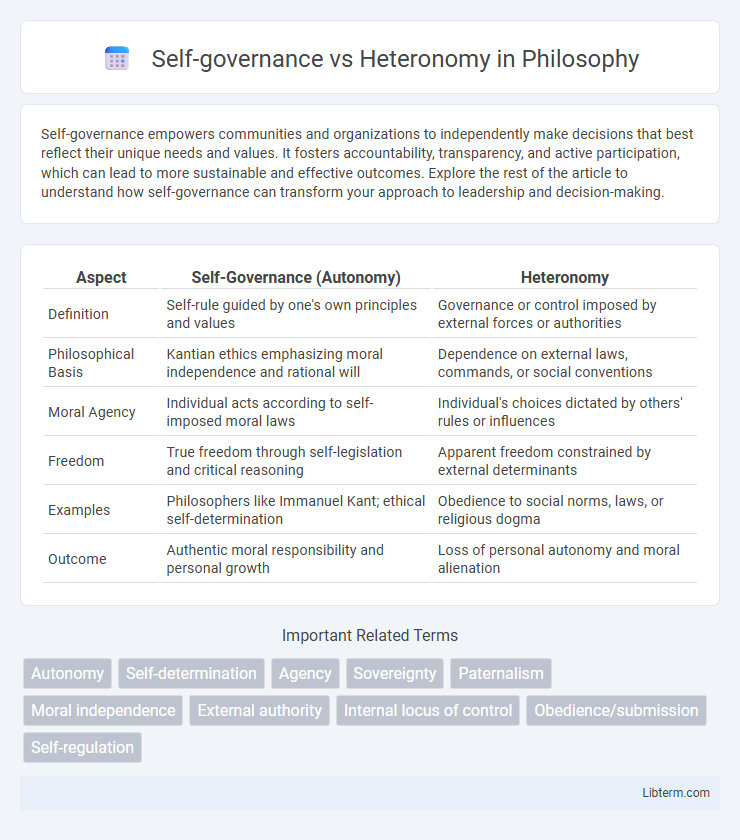Self-governance empowers communities and organizations to independently make decisions that best reflect their unique needs and values. It fosters accountability, transparency, and active participation, which can lead to more sustainable and effective outcomes. Explore the rest of the article to understand how self-governance can transform your approach to leadership and decision-making.
Table of Comparison
| Aspect | Self-Governance (Autonomy) | Heteronomy |
|---|---|---|
| Definition | Self-rule guided by one's own principles and values | Governance or control imposed by external forces or authorities |
| Philosophical Basis | Kantian ethics emphasizing moral independence and rational will | Dependence on external laws, commands, or social conventions |
| Moral Agency | Individual acts according to self-imposed moral laws | Individual's choices dictated by others' rules or influences |
| Freedom | True freedom through self-legislation and critical reasoning | Apparent freedom constrained by external determinants |
| Examples | Philosophers like Immanuel Kant; ethical self-determination | Obedience to social norms, laws, or religious dogma |
| Outcome | Authentic moral responsibility and personal growth | Loss of personal autonomy and moral alienation |
Understanding Self-Governance: Definition and Core Principles
Self-governance refers to the capacity of individuals or groups to regulate their own behavior and make decisions independently, emphasizing autonomy, personal responsibility, and internal motivation. Core principles include self-determination, accountability to oneself, and the ability to set and pursue goals without external control or coercion. This contrasts with heteronomy, where actions and decisions are guided by external forces or authorities rather than one's own will.
What is Heteronomy? Exploring External Control
Heteronomy refers to the condition where an individual's actions and decisions are governed by external forces or authorities rather than by their own autonomous will. This concept highlights the influence of external control in shaping behavior, such as laws, social norms, or coercive powers imposed by institutions or other agents. Understanding heteronomy involves examining how outside pressures limit personal freedom and inhibit self-governance in ethical, political, or psychological contexts.
Historical Perspectives on Self-Governance and Heteronomy
Historical perspectives on self-governance highlight its emergence in ancient city-states, where citizens exercised direct control over political decisions, fostering autonomy and civic responsibility. Heteronomy, often linked with external rule or moral imposition, was prevalent in feudal systems and colonial administrations, where authority was imposed by rulers or foreign powers limiting individual or local freedom. Key philosophical debates, notably by Kant, positioned self-governance as autonomous moral agency, contrasting with heteronomy understood as obedience to external laws or influences.
Key Differences Between Self-Governance and Heteronomy
Self-governance involves individuals or groups making decisions independently based on internal values and principles, while heteronomy is characterized by external control where rules and decisions are imposed by outside authorities. Key differences include the source of authority--internal in self-governance versus external in heteronomy--and the degree of autonomy, with self-governance allowing personal or collective freedom versus heteronomy's reliance on obedience to imposed laws or norms. This distinction impacts motivation, with self-governed entities exhibiting intrinsic motivation, contrasting with heteronomous systems where compliance is often driven by obligation or fear of sanction.
Psychological Impacts: Autonomy vs. External Influence
Self-governance enhances psychological well-being by fostering intrinsic motivation, self-efficacy, and a strong sense of personal identity, promoting resilience against stress and anxiety. In contrast, heteronomy often leads to diminished autonomy, increased external control, and feelings of helplessness, which can contribute to reduced mental health and higher susceptibility to depression. Research in motivational psychology consistently shows that autonomy-supportive environments improve cognitive function, emotional regulation, and overall life satisfaction.
Self-Governance in Modern Society: Benefits and Challenges
Self-governance in modern society promotes individual autonomy and empowers citizens to make decisions that directly affect their lives, fostering accountability and active civic participation. It enhances social cohesion by encouraging community-based problem-solving and reduces reliance on centralized authorities, which can lead to more tailored and responsive governance. However, challenges include the risk of uneven resource distribution, potential conflicts between diverse interests, and the need for effective mechanisms to ensure inclusivity and prevent marginalization within self-governing communities.
Heteronomy in Institutions: Examples and Consequences
Heteronomy in institutions occurs when external authorities dictate rules and decisions, limiting the autonomy of individuals or groups within the system. This lack of self-governance can lead to decreased motivation, reduced innovation, and lower trust in institutional processes, as seen in rigid corporate hierarchies and authoritarian governments. The consequences often include inefficiency and resistance among members, highlighting the importance of balancing control with participatory decision-making.
Cultivating Autonomy: Strategies for Personal Development
Cultivating autonomy involves fostering self-governance, where individuals make decisions based on intrinsic values rather than external controls characteristic of heteronomy. Strategies include reflective self-assessment, goal-setting aligned with personal beliefs, and developing critical thinking to resist external pressures. Consistent practice of autonomous decision-making enhances personal development and promotes psychological well-being.
Societal Implications: Balancing Autonomy and Authority
Self-governance empowers individuals and communities to make decisions reflecting their values, fostering personal responsibility and social cohesion. Heteronomy, characterized by external control or authority, can ensure order and uniformity but risks suppressing individual freedoms and local needs. Balancing autonomy and authority requires nuanced policies that respect individual rights while maintaining societal stability and collective welfare.
Self-Governance vs. Heteronomy: Which Path Leads to Flourishing?
Self-governance fosters individual autonomy by enabling decision-making aligned with personal values, promoting psychological well-being and authentic flourishing. Heteronomy, characterized by external control and imposed rules, often undermines intrinsic motivation and can lead to diminished self-efficacy, restricting personal growth. Empirical studies in psychology reveal that autonomous self-governance correlates strongly with higher life satisfaction and resilience, marking it as the more effective path to flourishing.
Self-governance Infographic

 libterm.com
libterm.com